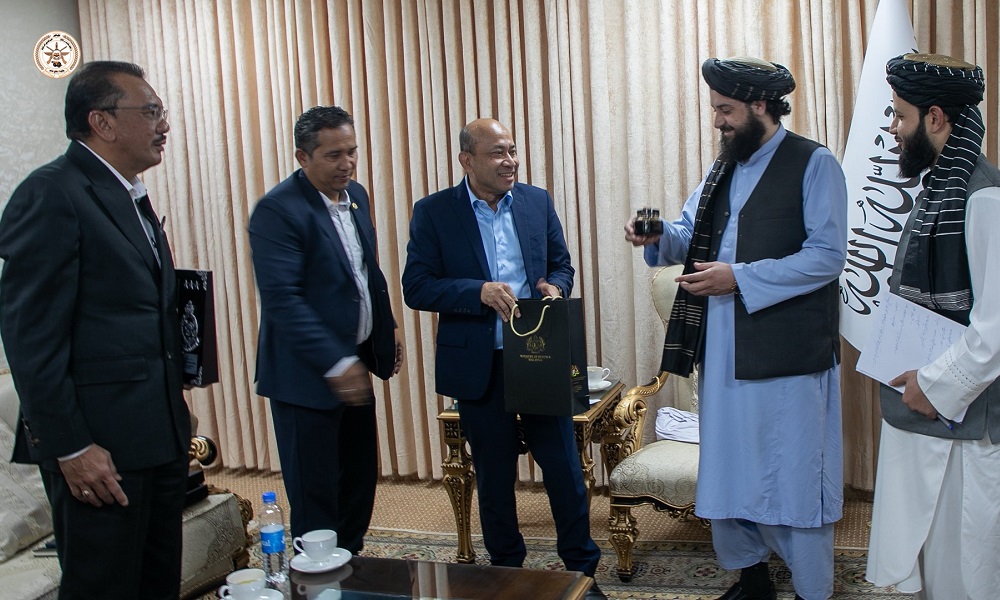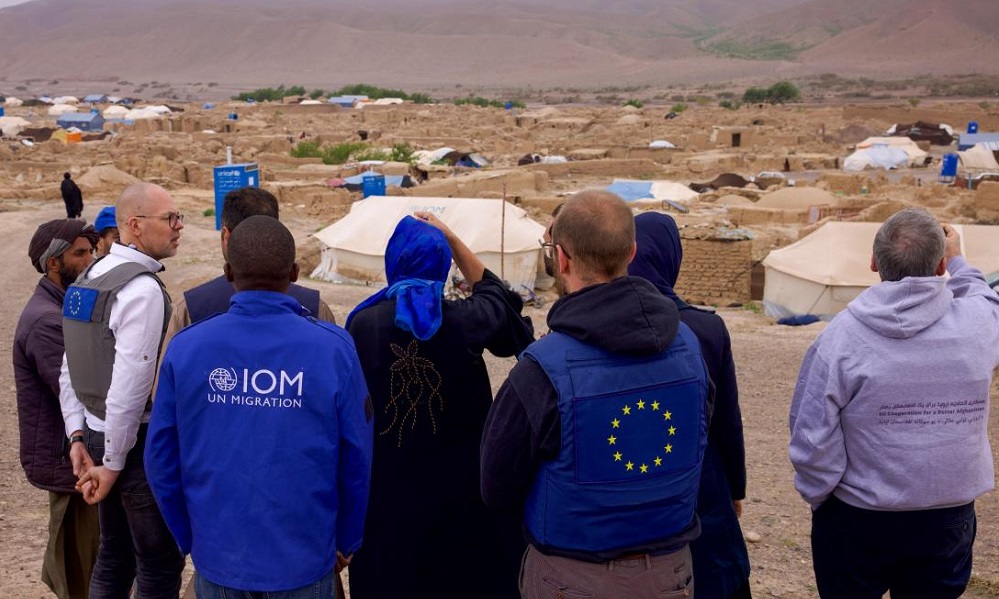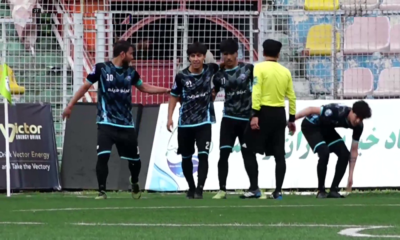Latest News
‘Sanction Pakistan’ hashtag campaign gathers momentum as Afghans speak out

Calls to impose sanctions on Pakistan for their alleged assistance to the Taliban have been mounting in the past week and by Monday, #SanctionPakistan was trending on Twitter.
As Afghan Twitter users rallied behind the sanctions hashtag, #EndProxyWar also started to gather momentum.
This social media movement comes amid the sharp escalation in violence across the country and just days after Afghanistan’s UN ambassador, Ghulam Isaczai, pleaded with members of the UN Security Council to pressure the Taliban to engage in peace talks.
In his address to the meeting on the Afghanistan situation, Isaczai said the attacks launched around the country have been done with the “direct support of more than 10,000 foreign terrorist fighters representing 20 groups”, including Al-Qaeda and ISIS (Daesh).
He stated that the Taliban “continue to enjoy a safe haven in and supply and logistics line extended to their war machine from Pakistan.”
Isaczai also stated that reports and videos show Taliban fighters “congregating close to the Durand Line” frontier to enter Afghanistan.
He said Taliban hold fund-raising events in Pakistan that the dead are transferred over the border for mass burials and fighters wounded are treated in Pakistani hospitals.
His statement added to the growing outcry among Afghans over the ongoing violence and the suffering being inflicted on the people.
Afghanistan’s First Vice President Amrullah Saleh on Monday also used the sanction hashtag in an appeal he put out to the world via Twitter.
He tweeted: “We call on UN & other international organizations to work with us in providing any type of assistance to massive number of people who have sought refuge in Kabul due to brutality, revenge killing, loot & rape by the Talibs. Painful scenes in the streets of Kabul. #SanctionPakistan”
Chris Alexander, a Canadian diplomat and politician, and former ambassador to Kabul, appears to have been one of the first to tweet using the two hashtags.
On August 2 he said: “There will be no permanent ceasefire in Afghanistan without sanctions against Pakistan. Pakistan’s ‘forever war’ must end. #EndProxyWar #SanctionPakistan”
He also tweeted: “Pakistan’s invasion of Afghanistan constitutes an armed attack & act of aggression under Chapter VII of the UN Charter.
“Any state that fails to act to end Pakistan’s invasion & prevent further Taliban brutality are betraying the women & girls of Afghanistan & making a complete mockery of their commitment to women’s rights,” he tweeted.
On Monday he retweeted a number of #SanctionPakistan posts after tweeting Sunday “Pakistan’s invasion of Afghanistan today deserves the same response as the disastrous Soviet invasion of 1979: armed resistance, international condemnation & sweeping sanctions. #SanctionPakistan”
Fatima Murchal, President Ashraf Ghani’s deputy spokeswoman, also joined in and raised her voice. “We are burning in the flame of the war imposed on us. This unbearable pain we endure due to Int terrorism requires the world to take a stance. This silence indicates a very high tolerance for terrorism. #SanctionTaliban #SanctionPakistan #EndProxyWarInAfghanistan”
Waheed Omer, Director General, Office of Public and Strategic Affairs, meanwhile said: “Hundreds of TB (Taliban) killed and injured daily. No TB patients in our hospitals. No funerals for them in our villages. No one knows their family, relatives, village. “Bodies transferred to Pak (Pakistan) for mass funerals. Injured taken to Pak hospitals for treatment. It’s PAK. #SanctionPakistan,” he said.
One well known social media activist tweeted Monday that the hashtag campaign was quickly gathering momentum.
He said: “Thank you all for speaking up. The Afghan twitter trend is now global with more than 100k and growing with a fast pace. Afghanistan needs all these voices. Speak louder and defend Afghanistan against Pakistani invasion. #SanctionPakistan”.
Latest News
Tripartite trade meeting held in Kabul to boost regional connectivity

A tripartite meeting between the delegations of Afghanistan, Turkmenistan and Kazakhstan was held in Kabul with the aim of connecting North Asia to South Asia and reducing transit and transportation costs among these three countries, the Ministry of Trade and Commerce said in a statement.
In this meeting, an agreement was reached on the creation of a joint technical committee to continue the talks.
This tripartite meeting was held under the leadership of Nooruddin Azizi, the Acting Minister of Industry and Commerce, Vice President of Turkmenistan and Srik Zhumangarin, the Deputy Prime Minister of Kazakhstan.
Earlier, a bilateral meeting was held between the delegation of the Islamic Emirate and Turkmenistan. The ministry of commerce said the participants of the meeting discussed the construction of a large joint logistics center in Torghondi, the trilateral transit agreement between the IEA, Turkmenistan, and Kazakhstan, the expansion of Afghanistan’s railway, solving issues related to Afghan transit and export goods, and a number of other commercial issues.
Latest News
No destructive groups including Daesh present in Afghanistan: Yaqub Mujahid

Acting Minister of National Defense Mohammad Yaqub Mujahid has said that no destructive groups including Daesh have physical presence in Afghanistan, adding the Islamic Emirate of Afghanistan (IEA) will not allow anyone to pose threat to any country in the region from the Afghan soil.
Mujahid made the remarks in a meeting with a delegation from Malaysia in Kabul on Thursday.
According to a statement released by the Ministry of Defense, Mujahid highlighted Malaysia’s “good treatment” of Afghan refugees and its long-standing relations with Afghanistan, and said that Malaysia is a powerful Islamic country and visits should increase.
He added that with the establishment of the Islamic Emirate, occupation and war ended in Afghanistan, and the country is fully secure.
Based on the statement, the Malaysian delegation called Afghanistan a friendly country and while emphasizing on comprehensive cooperation, it assured that what they have seen in Afghanistan will be shared with the authorities of their country.
Latest News
EU allocates 17 million euros to support Afghans on the move

The European Union signed an agreement worth 17 million euros with the International Organization for Migration (IOM) to improve access to basic services, increased economic opportunities and protection for Afghans on the move and their host communities in Afghanistan.
The needs of women and girls are a particular focus of the programme, EU said in a statement released on Thursday.
The statement noted that from January 2023 until April 2024, over 1.5 million Afghans returned from Pakistan and Iran.
“I am deeply moved by the hardship returnees face when being deported to Afghanistan. In a country suffering from poverty and climate change, and in a city that just saw devastating earthquakes, this truly is a crisis within a crisis.”, said Peteris Ustubs, Director for the Middle East, Asia and Pacific of the European Commission’s Department for International Partnerships during the signing ceremony at the IOM transit centre in Herat.
Raffaella Iodice, EU Chargée d’Affaires a.i. to Afghanistan, added “The solidarity of the Afghan people towards their brothers and sisters is an inspiration. We must assure that communities hosting and helping new arrivals are supported. The partnership with IOM ensures access to essential services and provides protection for Afghan returnees and their host communities. As women and girls can be particularly affected, we make sure that all members of society can benefit”.
“IOM’s continued partnership with the EU has been critical in enabling our teams to reach hundreds of thousands of Afghan returnees and other vulnerable communities in the country”, said IOM Afghanistan Chief of Mission, Maria Moita. “Thanks to this renewed commitment, we will be able to focus on addressing the immense challenges in the areas of return and contribute to reintegration, social cohesion, and longer-term solutions for those communities.”
This additional contribution is part of a 5-year programme that is being implemented across Afghanistan and in four countries in the region. It builds on the EU’s previous support to IOM to improve the wellbeing of Afghans forced to return to the country, EU said.
-

 Latest News3 days ago
Latest News3 days agoRashid Khan named AWCC’s brand ambassador
-

 Regional4 days ago
Regional4 days agoIranian president lands in Pakistan for three-day visit to mend ties
-

 Sport4 days ago
Sport4 days agoKolkata beat Bengaluru by one run in IPL as Kohli fumes at dismissal
-

 Sport5 days ago
Sport5 days agoACL: Aino Mina 3-0 Istiqlal Kabul; Attack Energy 3-0 Khadim
-

 Climate Change5 days ago
Climate Change5 days agoRescuers race to reach those trapped by floods in China’s Guangdong
-

 World4 days ago
World4 days agoMalaysian navy helicopters collide in mid-air, 10 killed
-

 Sport3 days ago
Sport3 days agoJaiswal ton powers Rajasthan to big IPL win
-

 Sport4 days ago
Sport4 days agoMawj Sahil player scores stunning halfway line goal in 1-0 win over Jawanan Wahedi
























